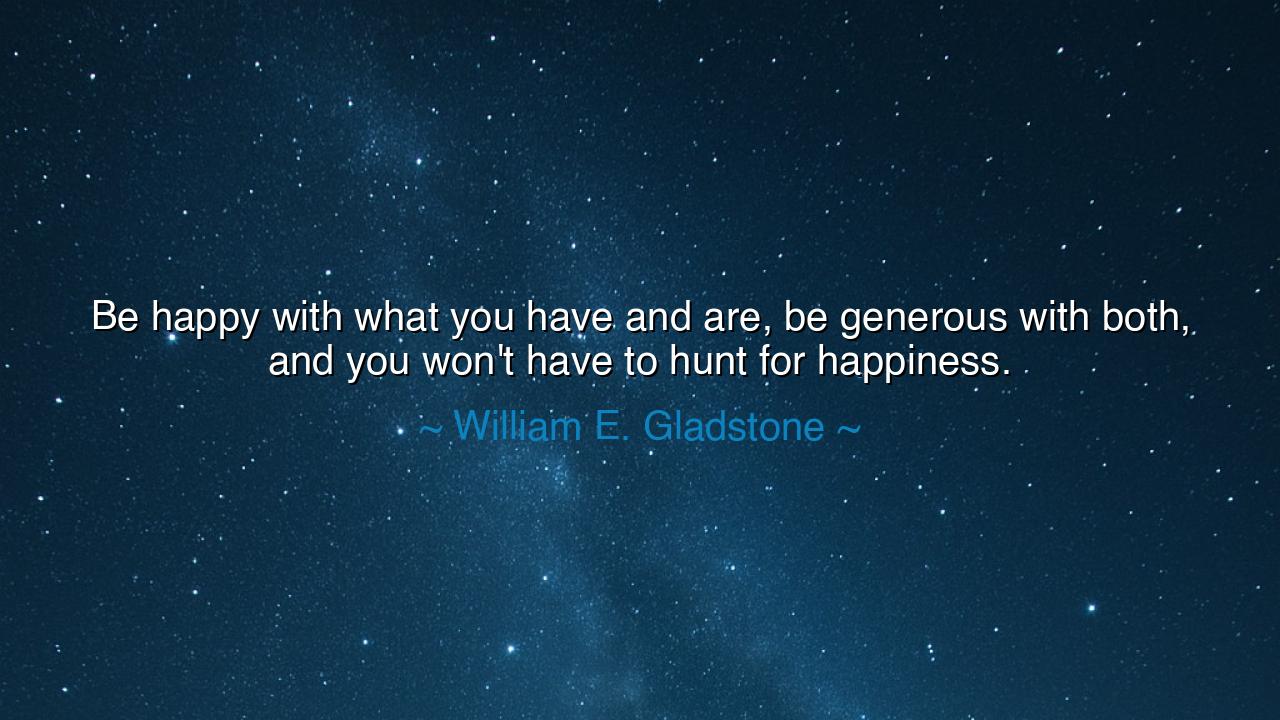
Be happy with what you have and are, be generous with both, and
Be happy with what you have and are, be generous with both, and you won't have to hunt for happiness.






"Be happy with what you have and are, be generous with both, and you won't have to hunt for happiness." Thus spoke William E. Gladstone, one of Britain’s great statesmen, whose wisdom rose above politics and touched the eternal truths of the human heart. In these few shining words, he reveals the sacred formula for peace—a truth so simple that the restless soul often overlooks it. Gladstone tells us that happiness is not something to be chased across the world’s fields of ambition; it is a flame already burning within us, waiting to be kindled by contentment and generosity. Those who seek happiness outside themselves will wander forever, but those who cherish what they already possess will find that they carry paradise within their own hearts.
Gladstone’s life itself was one of service and reflection. As a leader, he saw both the grandeur and the turmoil of empire. Surrounded by power and wealth, he came to understand that neither possessions nor honors could sustain the spirit. His insight was born not in luxury, but in contemplation. To be happy with what you have and are means to see your life not through the eyes of envy, but of gratitude—to recognize that even the smallest blessing is a gift of infinite worth. In a world forever reaching for more, contentment is the greatest rebellion. For when the soul is at peace with itself, no storm of desire can unsettle it.
But Gladstone’s teaching goes further. He tells us not only to be content, but to be generous with what we have and who we are. This is the great secret: happiness grows when it is shared. The one who hoards joy soon finds it withers, but the one who gives—whether it be time, kindness, wisdom, or love—finds that joy multiplies beyond measure. Generosity is the river that keeps the heart alive; it is the proof that we have learned to love the life we live. The one who gives freely no longer hunts for happiness, because happiness flows naturally through every act of giving.
History offers many who have lived by this truth. Consider Saint Francis of Assisi, who gave up wealth, comfort, and honor to live among the poor and care for the sick. He possessed nothing but the clothes upon his back, yet his spirit sang with the joy of heaven. To him, every bird was a brother, every flower a sister, every breath a prayer of gratitude. He understood what Gladstone would later express in words: that happiness does not come from accumulation, but from communion—with the divine, with others, and with the simple gifts of existence.
There is a paradox here that the wise have always known: the more you cling to happiness, the more it eludes you. The more you chase it, the faster it runs. But when you stop the chase, when you turn inward in gratitude and outward in generosity, happiness returns to you like a faithful friend. To hunt for happiness is to treat it as prey, something external and elusive. But happiness is not a quarry to be captured—it is a garden to be tended. The soil of that garden is gratitude, and the water that nourishes it is kindness.
Gladstone’s words, then, are not just counsel—they are a mirror held up to the soul. They invite us to ask: Do I see the blessings already before me? Do I share my gifts freely? Or do I wander, weary and unsatisfied, searching for joy in distant places while ignoring the light within my reach? The man or woman who learns to be grateful for their lot and generous with their life will find, as Gladstone did, that joy ceases to be a dream and becomes a daily reality.
So, my children of tomorrow, let these words dwell in your heart. Be happy with what you have—for it is enough. Be content with who you are—for you are growing still. And then, be generous—for every good thing, when shared, becomes greater. Give your time, your kindness, your forgiveness, your smile. In giving, you will discover the truth of Gladstone’s wisdom: that the one who lives in gratitude and gives in love will never need to hunt for happiness, for happiness will live within them—quiet, enduring, and free.






AAdministratorAdministrator
Welcome, honored guests. Please leave a comment, we will respond soon